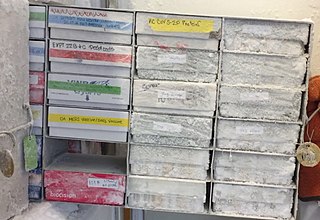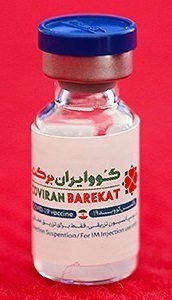Related Research Articles
FUJIFILM Diosynth Biotechnologies, abbreviated FDB and also referred to simply as Diosynth, is a biopharmaceutical contract manufacturing organization that develops manufacturing processes and manufactures active ingredients and provides fill and finish services for pharmaceutical companies. FUJIFILM Diosynth Biotechnologies is the world's second largest contract manufacturer of biopharmaceuticals, with manufacturing facilities in Morrisville, North Carolina and College Station, Texas in the United States, Teesside, United Kingdom and Hillerød, Denmark in Europe, and recently added sites in Thousand Oaks, California and Watertown, Massachusetts. FUJIFILM Diosynth Biotechnologies operates a highly automated multipurpose manufacturing facility in College Station, Texas under the federal government's Center for Innovation in Advanced Development and Manufacturing (CIADM) program, which is the largest scale-out cell culture manufacturing facility in the United States.
The pharmaceutical industry in India was valued at an estimated US$42 billion in 2021 and is estimated to reach $130 billion by 2030. India is the world's largest provider of generic medicines by volume, with a 20% share of total global pharmaceutical exports. It is also the largest vaccine supplier in the world by volume, accounting for more than 60% of all vaccines manufactured in the world. Indian pharmaceutical products are exported to various regulated markets including the US, UK, European Union and Canada.
Emergent BioSolutions Inc. is an American multinational specialty biopharmaceutical company headquartered in Gaithersburg, Maryland. It develops vaccines and antibody therapeutics for infectious diseases and opioid overdoses, and it provides medical devices for biodefense purposes.

The Biomedical Advanced Research and Development Authority(BARDA) is a U.S. Department of Health and Human Services (HHS) office responsible for the procurement and development of medical countermeasures, principally against bioterrorism, including chemical, biological, radiological and nuclear (CBRN) threats, as well as pandemic influenza and emerging diseases. BARDA was established in 2006 through the Pandemic and All-Hazards Preparedness Act (PAHPA) and reports to the Office of the Assistant Secretary for Preparedness and Response (ASPR). The office manages Project BioShield, which funds the research, development and stockpiling of vaccines and treatments that the government could use during public health emergencies such as chemical, biological, radiological or nuclear (CBRN) attacks.

Samsung Biologics is a South Korean biotechnology company headquartered in Songdo, Incheon, South Korea. The biotech division of Samsung Group, it provides contract development and manufacturing (CDMO) services to the biopharmaceutical industry.

The COVID-19 pandemic has affected many scientific and technical institutions globally, resulting in lower productivity in a number of fields and programs. However, the impact of the pandemic has also led to the opening of several new research funding lines for government agencies around the world.

Operation Warp Speed (OWS) was a public–private partnership initiated by the United States government to facilitate and accelerate the development, manufacturing, and distribution of COVID-19 vaccines, therapeutics, and diagnostics. The first news report of Operation Warp Speed was on April 29, 2020, and the program was officially announced on May 15, 2020. It was headed by Moncef Slaoui from May 2020 to January 2021 and by David A. Kessler from January to February 2021. At the end of February 2021, Operation Warp Speed was transferred into the responsibilities of the White House COVID-19 Response Team.
Grand River Aseptic Manufacturing (GRAM) is a clinical and commercial sterile manufacturing contractor to the pharmaceutical industry. It has lyophilization, terminal sterilization, analytical, microbiological testing services.

The COVID-19 vaccination programme in the United Kingdom is an ongoing mass immunisation campaign for coronavirus disease 2019 (COVID-19) during the COVID-19 pandemic in the United Kingdom.
The Vaccines Manufacturing and Innovation Centre (VMIC) is a vaccine research and manufacturing facility under construction in Harwell Science and Innovation Campus in Oxfordshire, England. Announced in December 2018 and originally planned to be opened in 2022, its planned opening date has been brought forward to 2021 as a response to the COVID-19 pandemic.

As of 23 September 2023, 13.4 billion COVID-19 vaccine doses have been administered worldwide, with 67.9 percent of the global population having received at least one dose. While 4.19 million vaccines were then being administered daily, only 22.3 percent of people in low-income countries had received at least a first vaccine by September 2022, according to official reports from national health agencies, which are collated by Our World in Data.

SARS-CoV-2, the virus that causes COVID-19, was isolated in late 2019. Its genetic sequence was published on 11 January 2020, triggering an urgent international response to prepare for an outbreak and hasten the development of a preventive COVID-19 vaccine. Since 2020, vaccine development has been expedited via unprecedented collaboration in the multinational pharmaceutical industry and between governments. By June 2020, tens of billions of dollars were invested by corporations, governments, international health organizations, and university research groups to develop dozens of vaccine candidates and prepare for global vaccination programs to immunize against COVID‑19 infection. According to the Coalition for Epidemic Preparedness Innovations (CEPI), the geographic distribution of COVID‑19 vaccine development shows North American entities to have about 40% of the activity, compared to 30% in Asia and Australia, 26% in Europe, and a few projects in South America and Africa.

COVIran Barekat is a COVID-19 vaccine developed in Iran by Shifa Pharmed Industrial Group, a subsidiary of the Barkat Pharmaceutical Group. It is an inactivated virus-based vaccine. Iranian authorities have authorized its emergency use. This makes it the first locally developed COVID-19 vaccine to be approved for emergency use in the Middle East.

The CureVac COVID-19 vaccine was a COVID-19 vaccine candidate developed by CureVac N.V. and the Coalition for Epidemic Preparedness Innovations (CEPI). The vaccine showed inadequate results in its Phase III trials with only 47% efficacy. In October 2021 CureVac abandoned further development and production plans for CVnCoV and refocused efforts on a cooperation with GlaxoSmithKline.

ApiJect Systems Corporation is an American company founded in 2018 by Marc Koska and based in Stamford, Connecticut that produces pre-filled single use plastic injectors. ApiJect works with pharmaceutical and biotech companies to fill their injectable drug products into single-dose prefilled injectors. The company claimed to have the capacity to manufacture pre-filled COVID-19 vaccine syringes by the end of 2020.

COVID-19 vaccination in Sri Lanka is an ongoing immunisation campaign against severe acute respiratory syndrome coronavirus 2 (SARS-CoV-2), the virus that causes COVID-19, in response to the ongoing pandemic in the country. As of late July, the Sinopharm BIBP vaccine accounted for 78% of the total 13.8 million vaccines obtained by Sri Lanka to date. The United States donated over 1.5 million Moderna vaccine through COVAX.

COVID-19 vaccination in Taiwan is an ongoing immunization campaign against severe acute respiratory syndrome coronavirus 2 (SARS-CoV-2), in response to the ongoing pandemic in the country.
The TRIPS Agreement waiver is a joint intervention communication by South Africa and India to the TRIPS council of the World Trade Organization (WTO) on 2 October 2020.
Vaccine equity means ensuring that everyone in the world has equal access to vaccines. The importance of vaccine equity has been emphasized by researchers and public health experts during the COVID-19 pandemic but is relevant to other illnesses and vaccines as well. Historically, world-wide immunization campaigns have led to the eradication of smallpox and significantly reduced polio, measles, tuberculosis, diphtheria, whooping cough, and tetanus.
The Developing Countries Vaccine Manufacturers Network (DCVMN) is a voluntary non-partisan public health alliance of health organizations and vaccine manufacturers. It has the goal of protecting people globally against known and emerging infectious diseases through the provision of a consistent supply of high quality vaccines at affordable prices for developing countries, to achieve vaccine equity. DCVMN includes manufacturers in Brazil, China, Cuba, India, Indonesia, Mexico, South Africa and other low and middle income countries (LMICs). It was established in 2000/2001, and is headquartered in Switzerland. As of 2021, the President is Sai D. Prasad, and the CEO is Rajinder Suri.
References
- 1 2 "Fill / finish". www.vaccinedevelopment.org.uk. 26 July 2020.
- ↑ "Vaccine Taskforce Aims" (PDF). assets.publishing.service.gov.uk. 6 April 2020. Retrieved 2020-07-26.
- ↑ Pagliusi, Sonia; Jarrett, Stephen; Hayman, Benoit; Kreysa, Ulrike; Prasad, Sai D.; Reers, Martin; Hong Thai, Pham; Wu, Ke; Zhang, Youn Tao; Baek, Yeong Ok; Kumar, Anand (July 2020). "Emerging manufacturers engagements in the COVID −19 vaccine research, development and supply". Vaccine. 38 (34): 5418–5423. doi:10.1016/j.vaccine.2020.06.022. PMC 7287474 . PMID 32600908.
- ↑ Miller, Joe; Kuchler, Hannah (2020-04-28). "Drugmakers race to scale up vaccine capacity". www.ft.com. Retrieved 2020-07-26.
- ↑ "HHS boosts national capacity to produce pandemic flu vaccine: New fill and finish manufacturing network strengthens pandemic readiness". www.phe.gov. Retrieved 2020-07-26.
- ↑ "Fill Finish Manufacturing Network". www.medicalcountermeasures.gov. Retrieved 2020-07-26.
- ↑ "Millions could be vaccinated against COVID-19 as UK secures strong portfolio of promising vaccines". GOV.UK. 20 July 2020. Retrieved 2020-07-26.